| |
Illustration
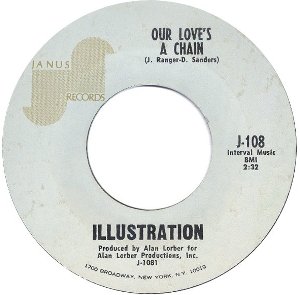
Upon the Earth / Our Love's a Chain - 7"
Janus - 1970
Michael Panontin
|
Though it probably peaked around 1969 or 1970, brass rock actually had a pretty good run, beginning with the Electric Flag's appearance at the Monterey International Pop Festival and stretching at least to Tower of Power's funky 1973 throwdown 'What is Hip?'. The top tier is pretty recognizable to even the most superficial music fan: the Chicago Transit Authority and Blood, Sweat and Tears, as well as Lighthouse up here in Canuckistan. But there are many one-hit and no-hit wonders that occupy the lower rungs that are worth remembering, from the obvious ones like the Ides of March, whose 1970 #2 corker 'Vehicle' can still be heard on oldies radio, to long-forgotten groups like the Sons of Champlin, Cold Blood, Colosseum or Quebec's Illustration.
At their peak, Illustration were a sprawling ten-piece with a requisite five-man horn section. The group formed in the late sixties in St. Jean-sur-Richelieu, just to the south of Montreal, the result of a merger of two local groups, the Phoenix of Ayre's Cliff and the Jades. As the renamed Sound Syndicate, they spent a good part of 1969 touring up and down the US Eastern Seaboard.
It was while the band were in St. Petersburg, FL that Janus Records pushed them for a name change. And so as the more au courant-sounding Illustration, they headed into A & R Studio in New York City to record an album's worth of music, from which this excellent double-sider was pulled. The nucleus of the group were singer Bill Ledster, guitarist Garry Beattie, keyboardist John Ranger, bassist Richard Terry and drummer Claude Roy (with saxophonists Norman Burgess and Donald Sanders, trumpeters Benoit Perreault and Leo Harinin, and trombonist Roger Homefield handling the brass end of the equation).
Illustration on stage were an even bigger force to be reckoned with. On a tour of the Deep South, at a club called The Crazy Horse in Birmingham, AL, the guys wowed the crowds until 4 AM. "It's hard to believe a sound like that in a Birmingham nightclub. It's so big the Horse's rattlers seem to quiver when they're playing," an obviously impressed Dennis Washburn gushed in The Birmingham News. "With three trumpets, two saxes, a trombone, organ, guitar, drums and bass they have a right to have a big sound, I guess, but it's unusual to find one that right with so many instruments."
The muscular, horn-driven 'Upon the Earth' was issued south of the border just in time for Christmas '69, but the charts down there failed to take much notice. It fared much better up here in Canuckistan, where it scored a respectable #67 on the RPM lists the following spring. It probably didn't hurt that Ledster's singing was, as Bill Amatneek described it in Rolling Stone, "like Tom Jones on his high notes and David Clayton Thomas on his lows". Dave Bist was even more evocative, writing in The Montreal Gazette, "It's like a piece of granite that's been shaped by Rodin - it's still a little rough, but it's beautiful."
But those deejays - and there were indeed a few - who turned the record over discovered a blue-eyed soul gem to rival the best of them. The genius of 'Our Love's a Chain' - apart from the obvious addition of singer Cherri Saint James ‒ is how the song eschews the brassy brawn that much of the genre seemed to obsess over and replaces it with a more feminized, and infinitely catchier, sound. Ledster and Saint James' duet is buoyant, romantic and eminently singable, and is perfectly punctuated with Ranger's organ and Burgess' punchy baritone sax. In other words, the perfect song for those tough-to-crack AM charts.
'Our Love's a Chain' bettered its topside a month later, climbing to #48 on the RPM chart in June. In Vancouver, it was especially loved with a six-week stand and an impressive #13 showing at the city's powerhouse CKLG-AM. Illustration included both songs on their self-titled long-player that year. Janus released the LP in a number of markets, including such unlikely places as New Zealand, Mexico, Brazil and Japan.
The group recorded a few tracks at RCA Victor for Roger Cardinal's 1971 Canuxploitation flick Apres-ski. But after their names were regrettably left off the soundtrack, Illustration, which must have been an unwieldy force at the best of times, started to get bogged down in legal and management issues and were never really heard from again. Ledster, Ranger, Terry and Roy would resurface a few years later as part of the proggier Man Made (whose 1973 LP is certainly worth searching out).
|
|
Suggestions
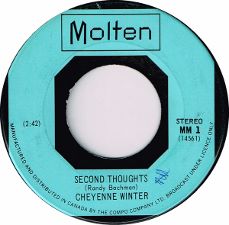
Cheyenne Winter
Second Thoughts / Sit Awhile - 7"
Molten
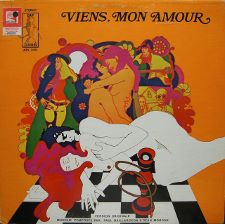
Paul Baillargeon and Dean Morgan
Viens, Mon Amour (Original Soundtrack)
Gap
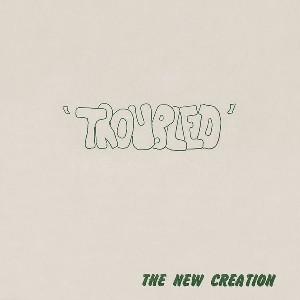
The New Creation
Troubled
Alphomega
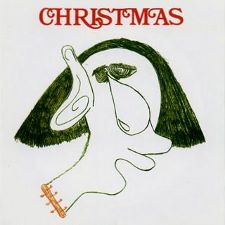
Christmas
Christmas
Paragon
|








